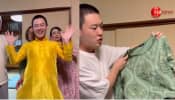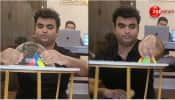Tokyo: Breast cancer is the second leading cause of cancer death in women globally. But, if the disease can be detected at early stage, the cure is possible.
The consultation rate of breast cancer screening in Japan is 20-30 percent, which is low as compared to the U.S and Europe.
Many countries are promoting initiatives aimed at increasing the numbers of the breast cancer screening rate.
A mammography device by Fujifilm provides easy screening and high resolution image to detect the disease.
"Mammography requires higher definition image technology equipment in the diagnosis of very small objects.
FUJIFILM has developed mammography device utilizing our various technology cultivated from the field of photography," said Ayako Muramoto, Medical Systems Div, Fujifilm Corporation.
Fujifilm is the leader in developing medical devices including X-ray film by using the technology of photography film.
Using the original technology, Fujifilm's digital X-ray imaging mammography greatly improves the usability and detection of breast cancer.
"We have developed the X-ray detector panel by using our leading scientific technology. Since a high-definition image can be obtained with low radiation, it significantly limits the radiation exposure to the body," added Ayako Muramoto.
Fujifilm is continuing with a research to reduce the pain at the breast while screening.
"Breast cancer can be prevented when people feel easier to come to consultation. And if detected at early stage, breast cancer can be cured. We are aiming to develop devices more gentle to women, with lower radiation," Muramoto said.
Computed Tomography, CT scan, is a technology that uses computer processed x-rays to produce virtual images of specific areas of the body.
Its images are used for diagnostic in various medical disciplines.
At Toshiba Medical Systems Corporation in Japan, a technical training was held for foreign delegates to show the industry's most advanced CT scanner.
The Toshiba's CT scanner is equipped with the "area detector technology", which can visualize the volume of scanned data to be reformatted as 4D representations.
In comparison with the conventional CT scanner, this new model has achieved much quicker image scanning.
"This device is developed significantly as compare to conventional one. It can also take video in place of photography," said Yoshihiko Kamei, Global Marketing Group, Toshiba Medical Systems Corporation.
The Toshiba cardiac CT model is equipped with 320 columns area detector, which can capture the range of 160mm wide in 1 rotation.
" It was not possible to capture the motion of the heart with the conventional CT scanner. However, this model enables to capture the whole image of the heart at one rotation cycle. By rendering the sequence of images, it creates the moving image of the heart," Kamei added.
The time of one rotation cycle takes less than a second.
This high-speed imaging is also contributes to a low exposure amount of X-ray radiation.
Toshiba equipped the low dose technology for all models, and it contributes to minimize the waiting time at hospital.
" In Asia, the penetration rate of CT to population is very low. It is important that needy patient can the facility to get CT scan. We hope that every needy patient can get better treatment with lower cost," Kamei further added.
Through its technical training programme, Toshiba is providing training to its engineers in advanced CT technology from across the world.
A Toshiba engineer from the Phillipines, Raymund Nester said, " Every time I come to the factory for training, It's very good for learning, enhance the knowledge."
For patients who cannot come to hospital for a Magnetic Resonance Imaging (MRI), Japan's ORIX Corporation has developed a mobile vehicle equipped with MRI device.
The company in Japan is providing the facility on rent to hospitals who cannot afford the device.
The facility will help the service to reach the maximum people.
" We wanted MRI but we could not afford to have it due to the budget and the space in the hospital. We heard about the rental MRI car. The service is suitable to our need. So far, we have detected an aneurysm, several tumors and so on.
Also we can refer patients to the specialized hospital after the MRI. It's very helpful. In future, we'd like to offer the concept of mobile medical rental service in Asian countries and contribute to better healthcare in countries there," said Yoshiko Kuroda, Doctor, Asanagi Hospital.
The expansion of techniques in medical devices is the need of an hour. And the Japanese manufacturers are keen to tap the world market with their advance technology.
















